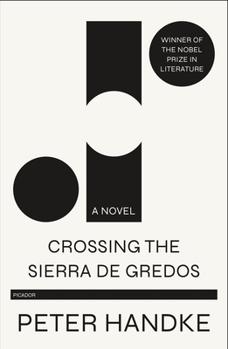Crossing the Sierra de Gredos
Select Format
Select Condition 
Book Overview
In this visionary novel, Nobel Prize winner Peter Handke offers descriptions of objects, relationships, and events that teach readers a renewed way of seeing; he creates a wealth of images to replace those lost to convention and conformity.
Format:Paperback
Language:English
ISBN:1250750644
ISBN13:9781250750648
Release Date:April 2020
Publisher:Picador Paper
Length:480 Pages
Weight:1.10 lbs.
Dimensions:1.0" x 5.4" x 8.3"
Customer Reviews
2 ratings
Four stars for Cymbeline?
Published by Thriftbooks.com User , 17 years ago
In reading and enjoying Handke's work I've been in good company: he's been shortlisted for a Nobel a few times (his politics may make that award an impossibility now) and Harold Bloom considered him one of the "writers of the century" in The Western Canon. True to his supposed avant-gardist status, his styles and forms have been Protean, but common threads in many (Weight of the World, My Year in the No-Man's Bay, On a Dark Night...), this one included, play up his remarkable powers of observation in nature, his subtle and meticulous identification of the connections between outer world and inner consciousness. His style in these has been a "seemingly casual tone, in which every word bears indispensible weight" (Kai Maristed) creating "..a kind of associative philosophical meditation that both maps and manifests the movements of mind." (Sven Bikerts) I'm personally uncomfortable with the term avant-garde; I prefer to think the very best writers, from Joyce and Proust to the late Gilbert Sorrentino, are not only great craftsmen but formal innovators, re-inventing fiction and pressing language into service it simply hadn't performed before. Gauguin averred that if art isn't revolutionary, it's not art; whatever your definitions, literary art in its most vibrant forms needn't be further labeled. At any rate, Crossing the Sierra de Gredos is both typical, easily recognizable Handke and something new and full of surprises, recalling Chaucer and maybe Swift and Cervantes. Even paragraph by paragraph, there is a playful stylistic richness of invention. I was baffled by some passages, even extended passages--some seemingly satiric episodes escaped me entirely--but I was enraptured or delighted by others. It is a testament to the power of this writer that, even though I have several books now waiting to be read that are surely excellent--short stories by Edward P. Jones, John Williams' Stoner, Solnit's Storming the Gates of Paradise, Seidel's Ooga-Booga, they all will probably be a step down from Handke. So there may be some unevenness in Crossing the Sierra de Gredos, representing an attempt that's not fully successful, but Handke is Handke. Cymbeline can be regarded as inferior only in comparison with other Shakespeare plays, and Handke needn't be made to compete with himself. With apologies to the new translation of Pomuk's Black Book, even slightly-flawed Handke may be the best thing I read all year. So five stars.
Classic Handke
Published by Thriftbooks.com User , 17 years ago
Once described as an author whose goal was to write in a completely different manner than his last book, Handke now produces a text that is typically, predictably unpredictable. A narrative set in timeless-modern-day, Handke crafts a medieval allegory of the pilgrim's journey of self-discovery. Long-time Handke readers will enjoy the twist and turns while readers new to Handke may want to consider an earlier text. Part Ulysses, part Canterbury Tales, all Handke. Not for the fainthearted reader. Enjoy!






